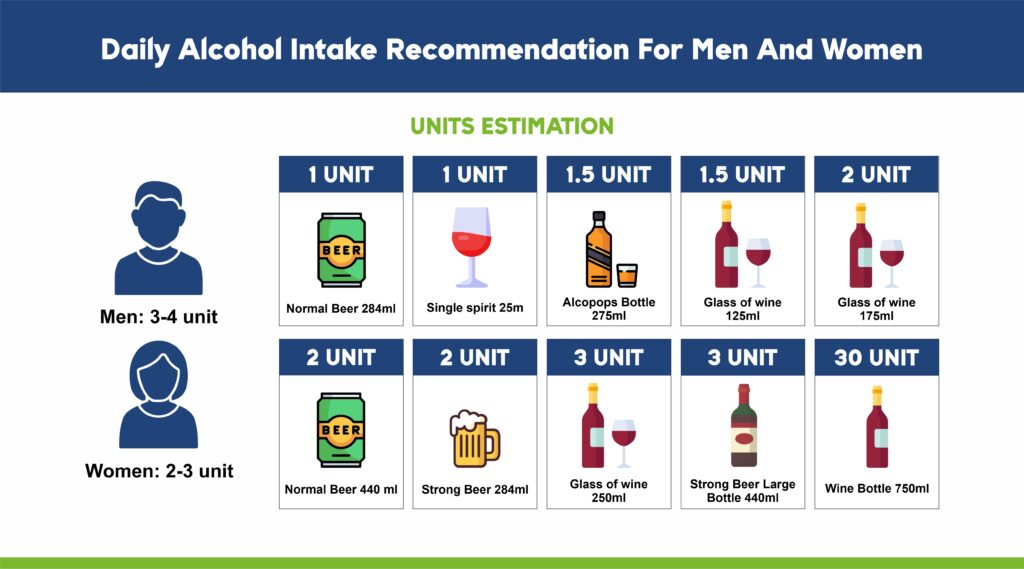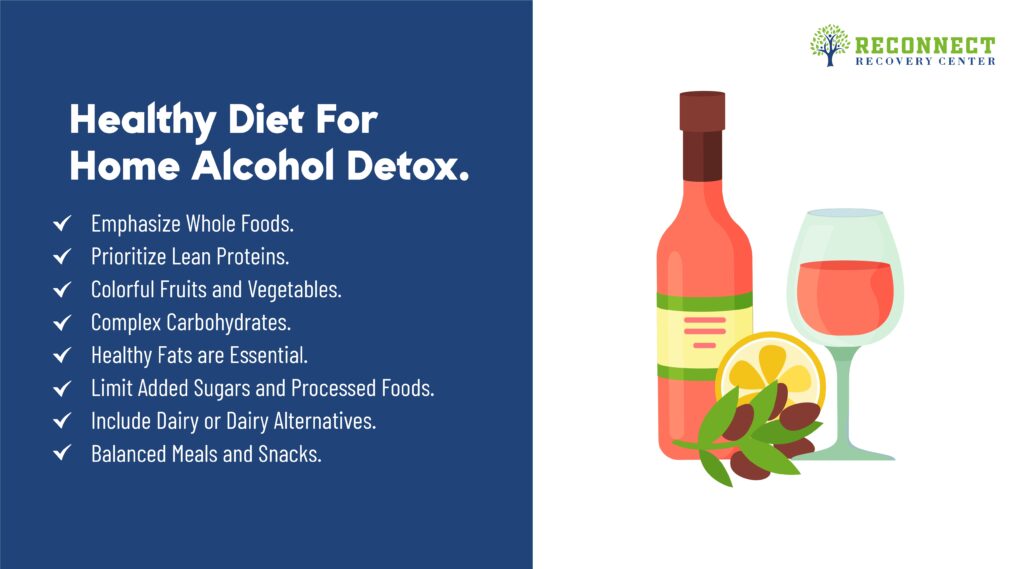Table of Contents
Alcohol Detox At Home: 10 Steps To Do
Are you looking for alcohol detox at home? We recommend you here the best suggestions and methods to do so!
According to a study by the National Survey on Drug Use and Health, More than 75% of people dependent on alcohol or drugs recover. However, the relapse rate for substance use disorders ranges from 40% to 60%.
But the first step to recovery from alcohol is always alcohol detox, which refers to the process by which a person’s body eliminates alcohol.
If you are alcohol dependent and want to do home alcohol detox, then Reconnect Recovery Center advises that it’s a considerable risk. But if you want to adopt the best strategy to detox at home, let’s delve into the article to learn about it.
Our alcohol rehab is your partner in overcoming alcohol dependence. Choose Progress, Choose Growth, and Choose Life. Join us today at 866-321-1553.
10 Steps To Do Alcohol Detox At Home
Detoxification from alcohol is a sensible and efficient way to reduce consumption. Here is a step-by-step tutorial to assist you in doing this:
Consult A Professional
Before starting any detox program at home, We recommend you consult a medical expert, especially if you have a history of severe alcoholism, have a medical condition, or are taking medication.
At Reconnect Recovery Center, You will find the best alcohol detox program. If you have an expense issue, then don’t worry! Our services are customized to your particular circumstance, and we suggest a secure course of action with insurance coverage.
But if you do not have a severe addiction or are in some hurry, consider the following steps!
Gradual Reduction
For those with mild to moderate alcohol dependence, a gradual reduction strategy can be effective. Follow this;
- Reduce by a little at first. For instance, cut back on alcohol by 10% per week.
- One standard drink in the United States typically has around 14 grams of pure alcohol in it, which is about similar to 1.5 ounces (44 ml) of distilled spirits, 5 ounces (148 ml) of wine, or 12 ounces (355 ml) of beer.
- If you now consume 14 standard drinks per week, try to reduce that number by 4 or 5.
- Next, gradually reduce by 2% each week.
- Pick specified days of the week to refrain from drinking alcohol for this purpose.
- Consider switching to lower-alcohol options if you drink more alcoholic beverages like light beers or lower-alcohol wines.
- Consider dilution with water, soda, or a low-calorie mixer to consume spirits. This can assist in lowering the total alcohol content of your beverage.
Keep Yourself Hydrated And Fed
Alcohol can cause the body to become dehydrated and lose vital nutrients. Drink plenty of water, herbal teas, and liquids high in electrolytes to maintain hydration. To restore essential nutrients, prioritize a balanced diet of fruits, vegetables, lean meats, and whole grains.
Including Exercise
Regular exercise improves physical health and benefits mental wellness when detoxing. Exercises like swimming, jogging, yoga, or walking can help lower stress, boost mood, and improve general well-being.
Utilize Relaxation Methods
Alcohol withdrawal can be emotionally taxing. Try relaxation techniques like deep breathing exercises, meditation, or mindfulness to handle stress and anxiety. These methods may be practical tools for keeping a calm and composed attitude.
Take Part In Diverting Activities
Finding productive diversionary activities can help you shift your attention away from alcohol cravings. Take part in enjoyable activities like reading, painting, cooking, or spending time with loved ones.
Create A Support Network
Create a network of friends, family, or community members who are there to support you and who are aware of your journey. Receiving encouragement and sharing your experiences can both significantly impact your achievement.
Engage In Self-Care
It’s essential to look after your physical, mental, and emotional health throughout this process. Rest well, partake in enjoyable activities, and give self-compassion top priority. Remember that you are on the road to being healthier and happy.
Take Healthy Meal
- Make complete, unprocessed foods like fruits, vegetables, whole grains, lean meats, and healthy fats the foundation of your meals.
- Include lean meat cuts, chicken, fish, beans, lentils, tofu, and other lean protein sources.
- Aim to have a variety of coloured fruits and veggies on half of your plate. They include a lot of antioxidants, vitamins, and minerals.
- Choose whole grains like oats, brown rice, quinoa, and whole wheat bread.
- Include plant-based fat sources like olive oil, nuts, seeds, and avocados.
- Calcium and other necessary elements can be found in dairy products or fortified dairy substitutes like almond or soy milk.
- Strive for well-balanced meals and snacks that contain various protein, carbs, and healthy fats.
- Take dietary supplements, including Vitamin B and D and omega-3 fatty acids.
Be Persistent And Patient
The process of detoxification calls for patience, commitment, and tenacity. Although there may be difficult times, remember that every step you take toward sobriety is a significant accomplishment.
Before this, if you want to take more suggestions, Visit our Center or Book Appointment online by contacting us at 866-321-1553.
What Are The Alcohol Detox Drinks For Alcohol Detox At Home?
Rehydrating, replenishing vital nutrients, and supporting the body’s natural detoxification processes are all things that detox drinks can do to help with the alcohol detox process. Here are some potent and nutritious alcohol detox drinks to think about:
- Lemon water: Add freshly squeezed lemon juice to a glass. Lemons are full of vitamin C, which aids in hydration and assists the liver’s detoxifying process.
- Tea with ginger: Ginger’s anti-inflammatory qualities can ease stomach discomfort. It is also recognized for promoting liver health. To create a tea, boil fresh ginger slices in water.
- Third, green tea: Green tea contains a lot of catechins, which are antioxidants that can boost the detoxification process and protect liver cells.
- Turmeric Milk: Curcumin is a potent anti-inflammatory and antioxidant substance found in turmeric. Warm milk should be combined with a teaspoon of turmeric and a small amount of black pepper (which improves absorption).
- Detox Water: Water infused with cucumber, lemon, mint, and a few berries is known as detox water. Vitamins, minerals, and antioxidants are all in this mix, providing hydration.
- Coconut water: Rich in electrolytes and naturally hydrating, coconut water can help restore minerals lost during detoxification.
- Vegetable juices: Vegetables like kale, spinach, celery, and carrots that have been freshly juiced offer a rich source of vitamins, minerals, and antioxidants.
- Herbal teas: Many herbal teas, including dandelion, nettle, and milk thistle, have been shown to assist the liver. They may provide gentle help for detoxification.
- Kombucha: The probiotics and enzymes included in kombucha, a fermented drink, can help to improve gut health. It’s crucial to select varietals with little or no alcohol.
- Bone Broth: Bone broth contains minerals and amino acids that help with cleansing and support general health.
Possible Medications For Alcohol Detox
For those trying to recover from alcohol use disorder (AUD), the initial rehabilitation stage is frequently alcohol detox. The following medications are FDA-approved for the treatment of alcohol detox and alcohol withdrawal:
- Benzodiazepines are sedative drugs used to treat anxiety, panic attacks, and seizures. They can significantly lower the likelihood of seizures in people experiencing the effects of alcohol withdrawal. Chlordiazepoxide (Librium) and diazepam (Valium) are typical benzodiazepines used to treat the symptoms of alcohol withdrawal.
- Anticonvulsants are drugs that are taken to stop seizures. Some anticonvulsants, such as carbamazepine (Tegretol), gabapentin (Neurontin), oxcarbazepine (Trileptal), and valproic acid (Depakene), may be used to treat alcohol withdrawal.
What Are The Risks Of Alcohol Detox At Home?
Reconnect Recovery Center claims alcohol detoxing at home has a high risk of significant health issues and potentially fatal withdrawal symptoms. Home detoxification carries some hazards, such as:
Seizures: Seizures associated with alcohol withdrawal can happen suddenly and without warning and can be dangerous.
Diuretic Effect: Alcohol has a diuretic effect that can cause electrolyte imbalances and dehydration. Due to their increased susceptibility to dehydration, elderly folks may find this particularly harmful.
Recurrence: Attempting a home detox without the right help and direction might make it more difficult to achieve lasting recovery and raise the risk of recurrence.
Delirium Tremens (DTs): The extreme form of alcohol withdrawal known as delirium tremens (DTs) can result in confusion, agitation, hallucinations, and other symptoms.
Heart problems: Alcohol withdrawal can alter blood pressure and heart rate, increasing the risk of a heart attack or stroke.
Mental health issues: Alcohol withdrawal can cause symptoms like agitation, paranoia, and even psychosis, exacerbating underlying mental health concerns like sadness or anxiety.
Get 10 Day Alcohol Detox Program With Reconnect Recovery Center
Our Opinion is alcohol detox at home is risky, but taking the first step toward alcohol detox can result in a happier, more rewarding life. You can succeed by recognizing the significance of detox, following our professional advice, and putting into helpful practice tactics like addiction therapies like group therapy or cognitive therapy. Keep in mind that you are not alone.
Utilize our network for support and, if necessary, seek medical advice. You’re well on your way to a better, alcohol-free future with perseverance and resolve. Call us for more information at 866-321-1553.
If you or someone you love struggles with drug or alcohol addiction, you’re not alone. Your recovery is possible. Call The Recovery Center today to learn about our inpatient programs located at facilities across the country. Our caring representatives can answer your questions about addiction and the rehab process, and calling is free and confidential.
Inpatient Rehab related topics:
- SAMHSA Announces National Survey on Drug Use and Health (NSDUH) Results Detailing Mental Illness and Substance Use Levels in 2021 | HHS.gov
- Home detox – supporting patients to overcome alcohol addiction – PMC (nih.gov)
Medical Disclaimer
The Reconnect Recovery Center aims to improve the quality of life for people struggling with substance use or mental health disorder with fact-based content about the nature of behavioral health conditions, treatment options and their related outcomes. We publish material that is researched, cited, edited and reviewed by licensed medical professionals. The information we provide is not intended to be a substitute for professional medical advice, diagnosis or treatment. It should not be used in place of the advice of your physician or other qualified healthcare providers.





